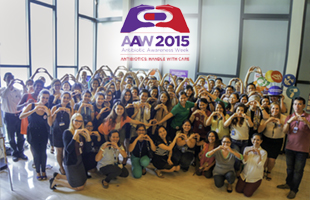
The World Health Organization (WHO) today launched the first World Antibiotic Awareness Week, which will run until 22 November. In response to growing antibiotic resistance globally, WHO stresses the need to preserve the effectiveness of antibiotics to maintain global health security and strongly urges everyone to use antibiotics responsibly.
“All government sectors and society must take action to avoid a post-antibiotic era in which common infections could become life-threatening again,” said Dr Shin Young-soo, WHO Regional Director for the Western Pacific. "Regional collaboration is needed to document and track the trends of drug-resistant infections and the use of antimicrobials."
What is antibiotic resistance?
Antibiotic resistance refers to the development of bacterial resistance to antibiotics. If this happens, common antibiotics may no longer work to treat illnesses such as pneumonia or diarrhoea.
Antibiotic resistance is caused by: (1) overuse and misuse of antibiotics in humans and animals; (2) poor-quality antibiotics; (3) the spread of drug resistance in health facilities and in the community; and (4) lack of hygiene.
Do your part against antibiotic resistance
This year’s campaign—with the theme “Antibiotics: Handle with Care”—calls on individuals and health-care professionals to take action to ensure that future generations continue to have effective antibiotics to treat potentially deadly bacterial infections.
WHO encourages individuals to use antibiotics responsibly by always completing the full course of antibiotics prescribed, and to refrain from sharing or using leftover antibiotics, or buying antibiotics without a prescription.
WHO also encourages health-care professionals to prescribe and dispense antibiotics only when truly needed. This includes always selecting the right antibiotic, in the right dose, and prescribing for the right duration. They also need to educate patients on the responsible use of antibiotics and follow good hygiene and infection prevention and control practices.
Moreover, policy-makers must tackle antibiotic resistance in their respective countries with robust national action plans, policies and regulations. Sustainable programmes must be financed and implemented in order to preserve the effectiveness of antibiotics.
“We must take decisive actions to preserve the effectiveness of antimicrobials before it is too late,” said Dr Shin.
Activities in the Region
Member States in the Region have lined up various activities to promote Antibiotic Awareness Week.
- Today, 16 November, the campaign kicks off in China with an antibiotic awareness dialogue with major international partners on policies to contain antimicrobial resistance.
- On 19 November in the Lao People’s Democratic Republic, ministries and development partners will discuss collective action to contain antimicrobial resistance in human and animal health.
- The Fiji National Action Plan on antimicrobial resistance will also be launched during this week, focusing on a multisectoral approach to combat antimicrobial resistance.
- Mongolia is launching a nationwide antibiotic awareness campaign using leading traditional and online media channels, in addition to training health care professionals and pharmacists nationwide.
- The Philippines will host the first Philippine Antimicrobial Resistance Summit, 24–25 November 2015, as part of antibiotic awareness week activities. The theme for the summit is “One Health, One Nation against Antimicrobial Resistance.” Philippine President Benigno S. Aquino III will be the keynote speaker.
- On 26 October 2015, Viet Nam launched a one million signature campaign of individuals making personal pledge to make better use of antibiotics and help save these vital medicines from becoming ineffective. This campaign will conclude in Hanoi during Antibiotic Awareness Week.
Progress against antibiotic resistance
In his address during the sixty-sixth session of the WHO Regional Committee in Guam, Dr Shin mentioned that the Action Agenda for Antimicrobial Resistance in the Western Pacific Region, endorsed during last year's session, is already yielding results
"Fiji, Samoa and Mongolia started developing multisectoral national action plans to combat antimicrobial resistance last year. Meanwhile, national plans and policies on antimicrobial resistance are being finalized in Australia, Cambodia, the Philippines and Viet Nam," Dr Shin said.
The Action Agenda for Antimicrobial Resistance in the Western Pacific Region aims to strengthen national plans, raise awareness across sectors, improve surveillance and strengthen health system's capacity to contain antimicrobial resistance.




